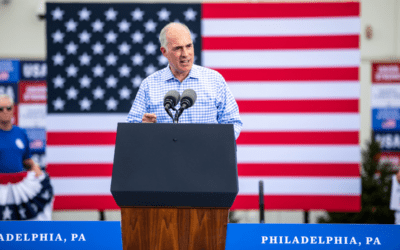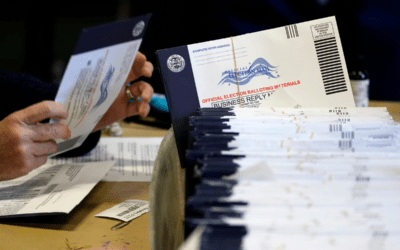
Image via Shutterstock
While most lawmakers head home for the weekend, out-of-work Pennsylvanians are left anxiously awaiting news of what their future holds.
The U.S. Senate adjourned on Thursday for a long weekend, without any progress toward addressing the expiring $600-a-week federal unemployment benefit that many Pennsylvanians have relied on to get by during the coronavirus pandemic.
Senate Majority Leader Mitch McConnell (R-KY) adjourned the chamber after a week marked by rampant disagreement within the Republican Party over what measures to include in the next coronavirus relief bill and how to address the expiring federal benefit. That scramble comes despite the fact that McConnell and the Senate had more than two months to negotiate with Democrats after the House passed an extension of the existing $600 weekly benefit through January 2021.
McConnell, his allies in Congress, and President Trump Donald instead refused to consider that legislation, which was passed in May, and waited until Monday—after all 50 states had already issued their final payments including the federal supplement—to release their own proposal. The GOP bill would temporarily slash the payment from $600 a week to $200 a week until states can phase in a new system that would replace 70% of a worker’s wages before unemployment, with a maximum cap of $500 per week.
That plan was widely criticized by Democrats, including Sen. Bob Casey of Pennsylvania.
“From what I’ve seen from the Republican proposal released last night, one thing is clear – if enacted, it would be an economic catastrophe for America and a disaster for middle-class families and essential workers,” Casey tweeted on Tuesday, later adding: “The economic crisis will continue until we get the public health crisis under control. In the meantime, people need real help.”
Pennsylvania’s other senator, Republican Pat Toomey, was less enthused about providing further economic aid. “We’ve already spent $3 trillion,” Sen. Pat Toomey told Fox News this month, suggesting future relief plans would have to be pared down. “For us to load the money cannon again and say, ‘Let’s spend literally trillions more,’ that’s a tough sell.”
The contrast between Casey and Toomey highlights the massive gap between the two parties on extending the $600 federal supplement, among other issues. “We’re still miles apart on a number of issues,” White House Chief of Staff Mark Meadows said on Wednesday.
While most lawmakers head home for the weekend, out-of-work Pennsylvanians are left anxiously awaiting news of what their future holds. The Pennsylvania Department of Labor & Industry told the Philadelphia Inquirer last week that it could not provide an exact number of recipients who’ve received the federal benefit, but the number is likely in the millions.
Pennsylvania has been uniquely devastated by the economic consequences of the coronavirus pandemic, with the state’s unemployment rate reaching 13% in June, above the national average of 11%. Since March 15, the state has received more than 3.5 million claims between regular unemployment and the Pandemic Unemployment Assistance program, which covers contractors and self-employed individuals who would not ordinarily qualify for benefits.
The $600-a-week benefit has provided an economic lifeline for many of those individuals. “The extra $600 has been by far the most effective part of our economic policy response to the coronavirus shock,” Josh Bivens and Heidi Shierholz of the Economic Policy Institute wrote in May.
Pennsylvania has been uniquely devastated by the economic consequences of the coronavirus pandemic, with the state’s unemployment rate reaching 13% in June, above the national average of 11%.
Several studies have shown the benefits have saved millions from financial ruin and prevented the economy from further collapse. The benefits were so critical that they prevented an estimated 12 million people from falling into poverty, according to research from Columbia University.
But without an expansion, that could all change, significantly hurting those who are unemployed in Pennsylvania, where the average state compensation payment in May was only $345 per week. The loss of the federal supplement could plunge millions of Americans—including many Pennsylvanians—into poverty, hunger, and homelesness.
“Every single material hardship you can think about is going to increase if we don’t extend the $600 pandemic unemployment compensation,” Indivar Dutta-Gupta, the co-executive director of the Georgetown Center on Poverty and Inequality, told COURIER earlier this month. “That includes hunger, homelessness, foreclosure, disease, and death as well, both from COVID-19, and even from the mental health challenges and stress that will ensue.”
The GOP has criticized the $600-a-week federal supplement to state unemployment benefits from the moment it was passed, arguing that it was too generous and disincentivized people from returning to work—an argument that has been debunked by both people who are unemployed and economists.
“There is no evidence right now at all that businesses cannot hire people when they have jobs available,” Dutta-Gupta said. “People will return to work when there is demand for those jobs and they feel safe when returning to work.”
Just this week, a new study from Yale found that the expanded benefits did not encourage layoffs, nor did they prevent people from returning to work once businesses began reopening.
“We find no evidence that more generous benefits disincentivized work either at the onset of the expansion or as firms looked to return to business over time,” the report’s authors wrote.
While there is data showing that many people earned more on unemployment than they did through their jobs, Democrats—including Pennsylvania Gov. Tom Wolf—argue that’s a case for raising wages, not reducing the social safety net.
“Every single material hardship you can think about is going to increase if we don’t extend the $600 pandemic unemployment compensation.”
“It’s a good time to think about what a family-sustaining wage is, and what a good job is,” Wolf said during an appearance at a state CareerLink office in York County on Tuesday. “There are just too many jobs that aren’t paying enough. And maybe when we started hearing complaints from some folks that $600 a week was actually encouraging people to stay on unemployment compensation and not go back to work, that should have sent a signal, a message, that maybe we ought to pay more.”
He said the Republican proposal was better than nothing, but “not enough,” and called on them to do more.
President Trump, for his part, has largely refrained from commenting publicly on the issue, instead spending much of June and July pushing for a payroll tax cut that would provide no help to unemployed workers. On Thursday, he and his administration backpedaled, offering a one-week extension of the $600 benefit.
“We want a temporary extension of enhanced unemployment benefits,” Trump said at the White House on Thursday. “This will provide a critical bridge for Americans who lost their jobs to the pandemic through no fault of their own.”
Democrats quickly rejected that idea, arguing a one-week extension was inadequate and failed to meet the crisis at hand.
“Do we want to continue to come to an agreement? Absolutely,” said top Senate Democrat Chuck Schumer. “But it’s got to meet the gravity of the problem.”

Central PA school board director cancels himself over gay guest speaker fallout
The Cumberland Valley School Board director resigned in protest on Monday after the board voted to reinstate Maulik Pancholy. The board originally...

New book details how Dave McCormick profited from 2008 financial crisis
Dave McCormick forged a relationship with Ray Dalio, the founder of Bridgewater Associates, in early 2008 and was rewarded with a job at Bridgewater...

18,000 PA residents who attended the Art Institute have student loans forgiven
The Biden administration announced last week they were forgiving student loans for 317,000 borrowers who attended the Art Institute. This will help...

Rep. Mike Kelly benefits from Inflation Reduction Act after voting against it
Congressman Mike Kelly was an outspoken critic of President Joe Biden’s climate change legislation but that didn’t stop him from using solar credits...

American Rescue Plan delivers computers and laptops for schools, libraries, nonprofits
President Joe Biden’s American Rescue Plan continues to deliver for Pennsylvanians. 12,000 residents annually will be eligible for computer devices...





